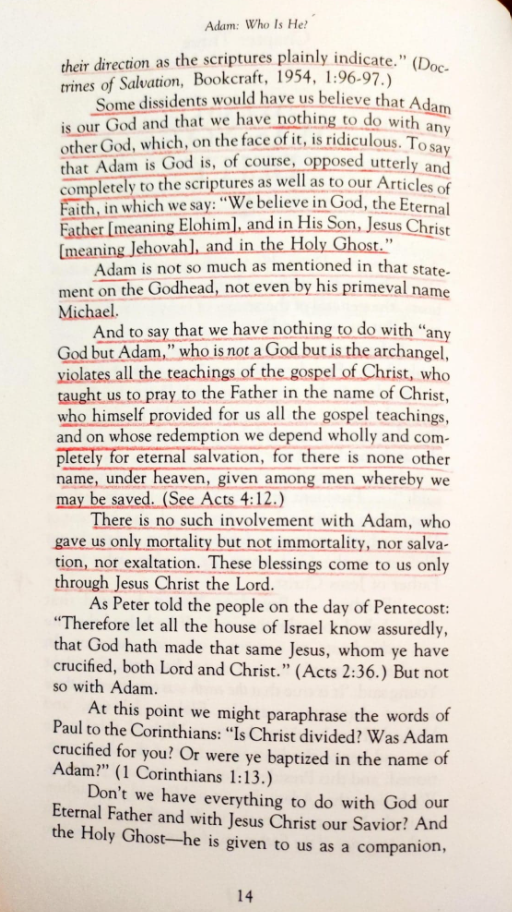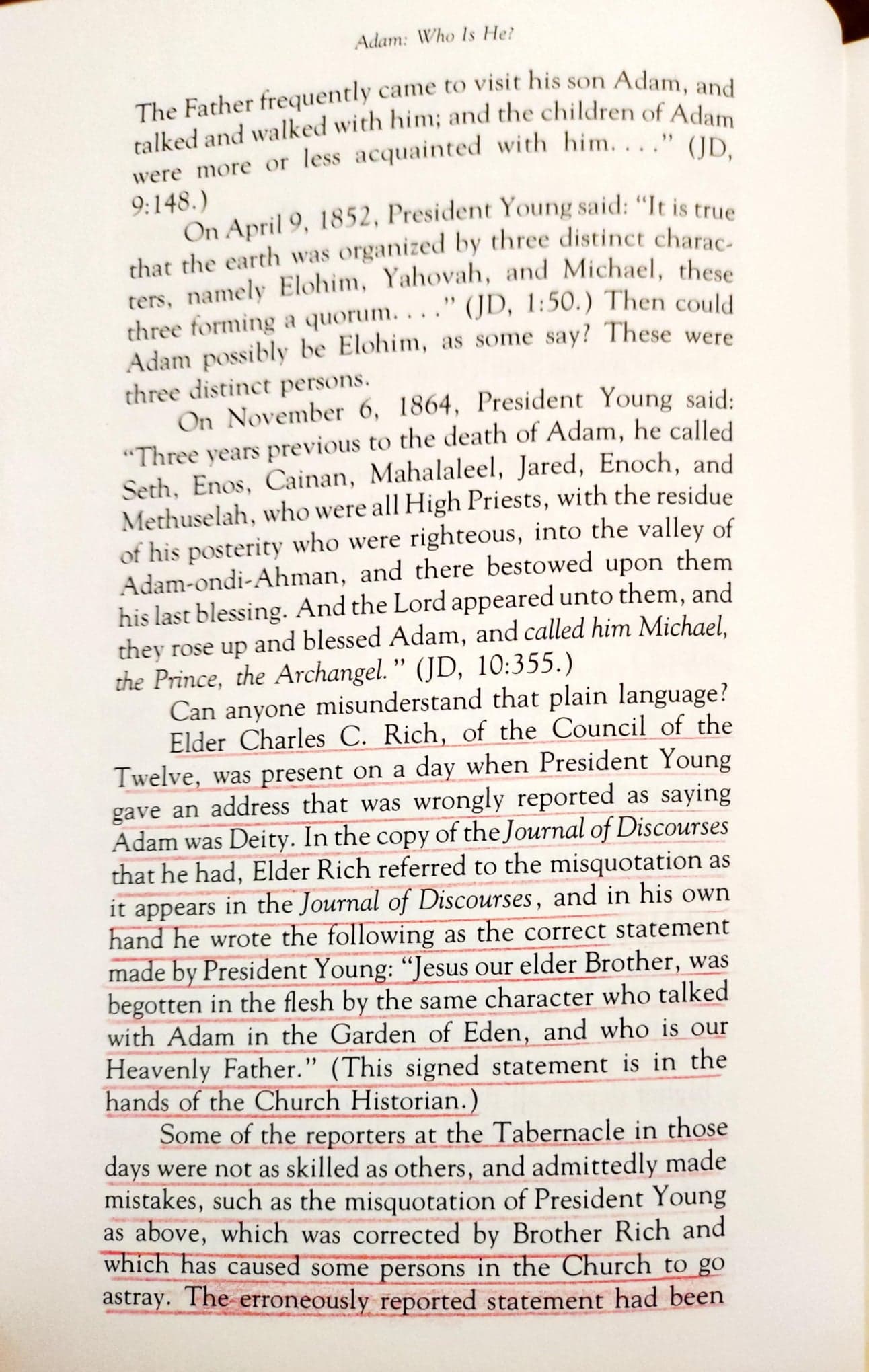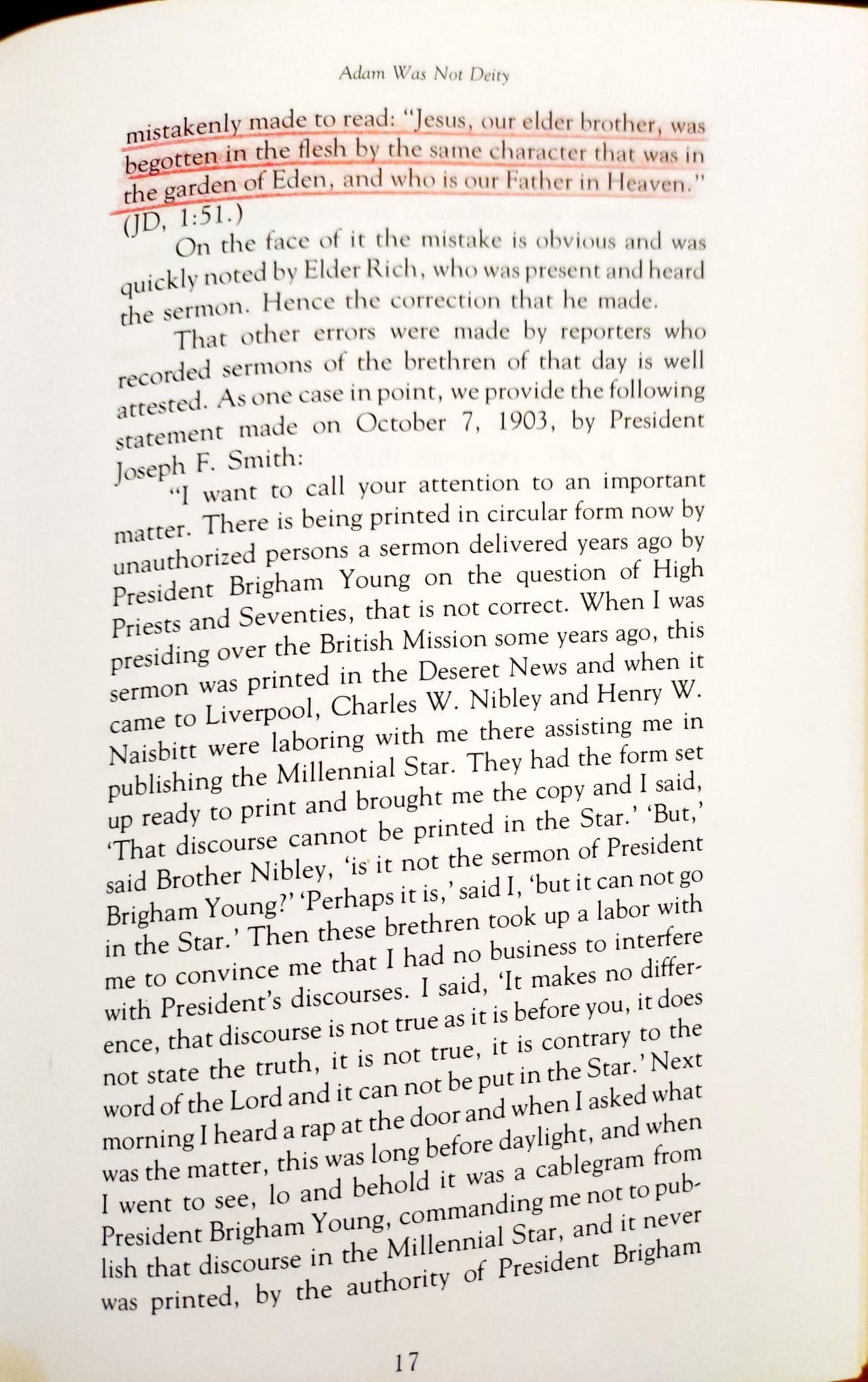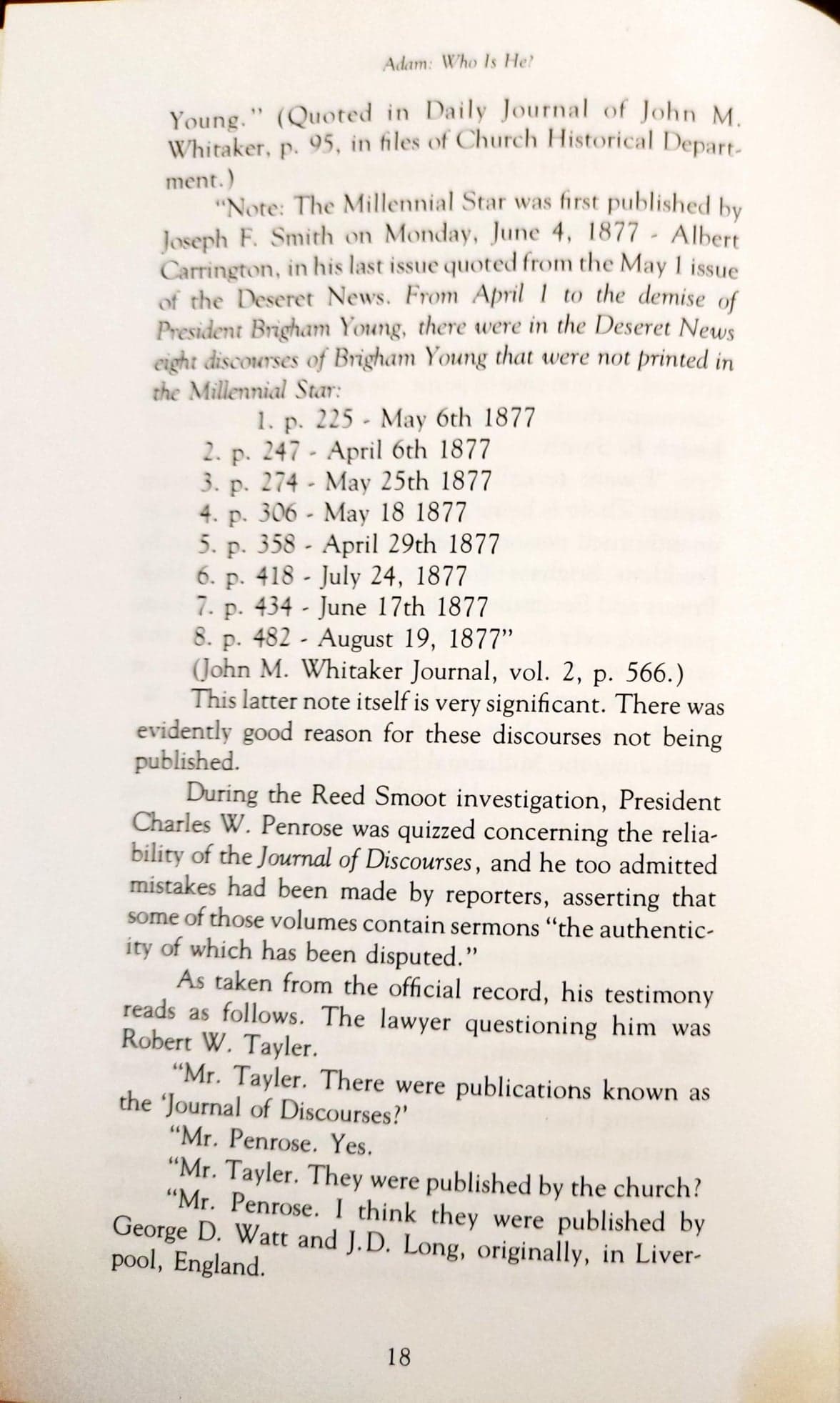Mark E. Petersen said the Adam-God doctrine as "ridiculous," and that Brigham was misquoted.
- Type
- Book
- Hearsay
- Direct
- Reference
Mark E. Petersen, Adam: Who Is He? (Salt Lake City: Deseret Book, 1976), 14, 16-18
- Scribe/Publisher
- Deseret Book
- People
- Mark E. Petersen, Henry W. Naisbitt, Brigham Young, John Whitaker, Charles W. Penrose, Albert Carrington, Joseph F. Smith, Charles W. Nibley, Charles C. Rich, Reed Smoot
- Audience
- Reading Public
- Transcription
Some dissidents would have us believe that Adam is our God and that we have nothing to do with any other God, which, on the face of it, is ridiculous. To say that Adam is God is, of course, opposed utterly and completely to the scriptures as well as to our Articles of Faith, in which we say: "We believe in God, the Eternal Father [meaning Elohim], and in His Son, Jesus Christ [meaning Jehovah], and in the Holy Ghost."
Adam is not so much as mentioned in that statement on the Godhead, not even by his primeval name Michael.
And to say that we have nothing to do with "any God but Adam," who is not a God but is the archangel, violates all the teachings of the gospel of Christ, who taught us to pray to the Father in the name of Christ, who himself provided for us all the gospel teachings, and on whose redemption we depend wholly and completely for eternal salvation, for there is none other name, under heaven, given among men whereby we may be saved. (See Acts 4:12.)
There is no such involvement with Adam, who gave us only mortality but not immortality, nor salvation, nor exaltation. These blessings come to us only through Jesus Christ the Lord. . . .
On April 9, 1852, President Young said: "It is true that the earth was organized by three distinct characters, namely Elohim, Yahovah, and Michael, these three forming a quorum. . . ." (JD, 1:50.) Then could Adam possibly be Elohim, as some say? These were three distinct persons.
On November 6, 1864, President Young said: "Three years previous to the death of Adam, he called Seth, Enos, Cainan, Mahalaleel, Jared, Enoch, and Methuselah, who were all High Priests, with the residue of his posterity who were righteous, into the valley of Adam-ondi-Ahman, and there bestowed upon them his last blessing. And the Lord appeared unto them, and they rose up and blessed Adam, and called him Michael, the Prince, the Archangel." (JD, 10:355.)
Elder Charles C. Rich was not present on the day when President Young gave an address that was wrongly reported as saying Adam was our Father in heaven. (See JD 1:51.) The sermon was delivered April 9, 1852, and Elder Rich returned April 21. In a copy of the Journal of Discourses Elder Ben E. Rich, son of Elder Charles C. Rich, referred to the misquotation as it appears in the Journal of Discourses, and in his own hand corrected the statement to read as follows: "Jesus our Elder Brother, was begotten in the flesh by the same character who talked with Adam in the Garden of Eden, and who is our Father in heaven." In this same statement Ben E. Rich wrote "As corrected above is what Prest. Young said, as testified to me by my father, C. C. Rich." (This signed statement is in the hands of the Church Historical Department.)
Some of the reporters at the Tabernacle in those days were not so skilled as others, and admittedly made mistakes, such as the misquotation of President Young as above, which was corrected by Brother Rich and which has caused some persons in the Church to go astray.
On the face of it the mistake is obvious. We find in Gen. 2:15-16 and 3:8-9 that God walked and talked with Adam in the Garden of Eden.
That other errors were made by reporters who recorded sermons of the brethren of that day is well attested. As one case in point, we provide the following statement made on October 7, 1903, by President Joseph F. Smith.
"I want to call your attention to an important matter. There is being printed in circular form now by unauthorized persons a sermon delivered years ago by President Brigham Young on the question of High Priests and Seventies, that is not correct. When I was presiding over the British Mission some years ago, this sermon was printed in the Deseret News and when it came to Liverpool, Charles W. Nibley and Henry W. Naisbitt were laboring with me there assisting me in publishing the Millennial Star. They had the form set up ready to print and brought me the copy and I said, `That discourse cannot be printed in the Star.' `But,' said Brother Nibley, `is it not the sermon of President Brigham Young?' `Perhaps it is,' said I, `but it can not go in the Star.' Then these brethren took up a labor with me to convince me that I had no business to interfere with President's discourses. I said, `It makes no difference, that discourse is not true as it is before you, it does not state the truth, it is not true, it is contrary to the word of the Lord and it can not be put in the Star.' Next morning I heard a rap at the door and when I asked what was the matter, this was long before daylight, and when I went to see, lo and behold it was a cablegram from President Brigham Young, commanding me not to publish that discourse in the Millennial Star, and it never was printed, by the authority of President Brigham Young." (Quoted in Daily Journal of John M. Whitaker, p. 95, in files of Church Historical Department.)
"Note: The Millennial Star was first published by Joseph F. Smith on Monday, June 4, 1877 - Albert Carrington, in his last issue quoted from the May 1 issue of the Deseret News. From April 1 to the demise of President Brigham Young, there were in the Deseret News eight discourses of Brigham Young that were not printed in the Millennial Star:
1. p. 225 - May 6th 1877
2. p. 247 - April 6th 1877
3. p. 274 - May 25th 1877
4. p. 306 - May 18 1877
5. p. 358 - April 29th 1877
6. p. 418 - July 24, 1877
7. p. 434 - June 17th 1877
8. p. 482 - August 19, 1877"
(John M. Whitaker Journal, vol. 2, p. 566.)
This latter note itself is very significant. There was evidently good reason for these discourses not being published.
During the Reed Smoot investigation, President Charles W. Penrose was quizzed concerning the reliability of the Journal of Discourses, and he too admitted mistakes had been made by reporters, asserting that some of those volumes contain sermons "the authenticity of which has been disputed."
- Citations in Mormonr Qnas
The B. H. Roberts Foundation is not owned by, operated by, or affiliated with the Church of Jesus Christ of Latter-day Saints.




